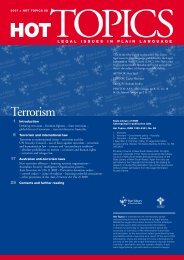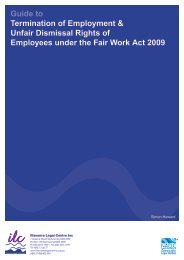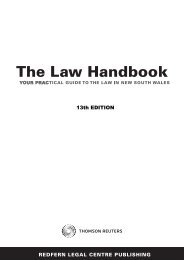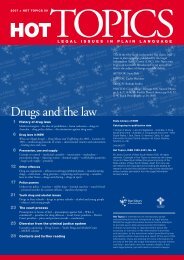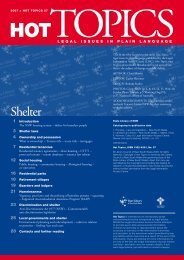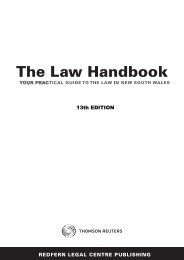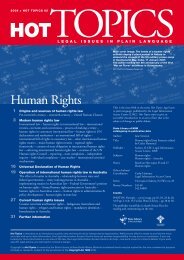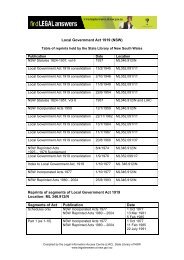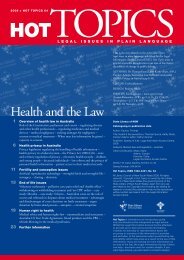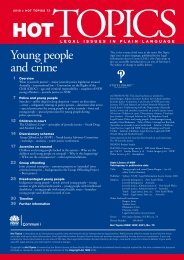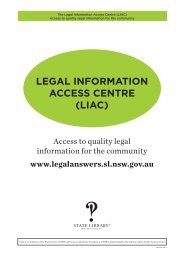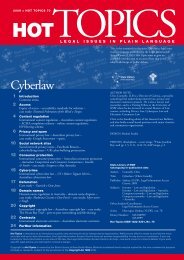Aboriginal people and the law - Legal Information Access Centre
Aboriginal people and the law - Legal Information Access Centre
Aboriginal people and the law - Legal Information Access Centre
Create successful ePaper yourself
Turn your PDF publications into a flip-book with our unique Google optimized e-Paper software.
58 The Law H<strong>and</strong>bookExtinguishmentNative title is extinguished by legislationpassed by <strong>the</strong> States where <strong>the</strong>re is a clearlegislative intention to that effect. This intentionmust be found by looking at <strong>the</strong> wordsof <strong>the</strong> relevant statute, <strong>and</strong> its purpose <strong>and</strong>context, to see whe<strong>the</strong>r <strong>the</strong> rights that <strong>the</strong>statute vested in <strong>the</strong> Crown or authorised<strong>the</strong> Crown to grant to o<strong>the</strong>rs were inconsistentwith all native title rights that mightsubsist in <strong>the</strong> l<strong>and</strong>.Where <strong>the</strong> Crown does grant or vest suchan interest in l<strong>and</strong>, native title is extinguishedto <strong>the</strong> extent of <strong>the</strong> inconsistency(see Extinguishment of native title at[2.360]). The recent decision of <strong>the</strong> HighCourt in Western Australia v Brown [2014]HCA 8 shows that <strong>the</strong> legislative provisionsmust be clearly inconsistent with any exerciseof native title rights to result inextinguishment. In that case, a mining companywas granted rights under <strong>the</strong> MountGoldsworthy mining lease <strong>and</strong> <strong>the</strong> Iron Ore(Mount Goldsworthy) Agreement Act 1964(WA) to construct a township to house mineworkers. Even though <strong>the</strong> l<strong>and</strong> was intensivelydeveloped to create <strong>the</strong> township,<strong>the</strong>re was held to be no inconsistency withall native title rights so as to bring abouttotal extinguishment. This conclusion wassupported by <strong>the</strong> requirement that <strong>the</strong> miningcompany had to permit <strong>the</strong> State <strong>and</strong>any o<strong>the</strong>r person to have access to <strong>the</strong> arealeased except where that access would undulyinterfere with <strong>the</strong> mining operations.That requirement pointed to an intention torecognise rights in third parties to haveaccess to <strong>the</strong> area of <strong>the</strong> lease. The fact thatsome areas might be so developed as toprevent access (by building houses <strong>and</strong>township facilities) did not mean that <strong>the</strong>lease as a whole had <strong>the</strong> effect of extinguishingrights, as it was <strong>the</strong> nature of <strong>the</strong> rightsgranted (<strong>and</strong> not <strong>the</strong> way in which <strong>the</strong>ymight be exercised) which had to beconsidered. Karpany v Dietman [2013] HCA47 confirms that legislation to regulate aright is unlikely to result in extinguishmentbecause <strong>the</strong> regulation of a right assumesthat <strong>the</strong> right continues to exist.What kind of rights?In 2002, <strong>the</strong> High Court h<strong>and</strong>ed down its decision inWestern Australia v Ward (2002) 213 CLR 1, settling <strong>the</strong>argument as to whe<strong>the</strong>r native title rights were suigeneris rights <strong>and</strong> interests (that is, different from o<strong>the</strong>rkinds), or merely a bundle of rights recognisable atcommon <strong>law</strong>. It found that native title was properlyrecognised as a bundle of rights <strong>and</strong> interests.The effect of this decision is debatable: at <strong>the</strong> very least<strong>the</strong> finding allows <strong>the</strong> court to determine native titlerights <strong>and</strong> interests as individual str<strong>and</strong>s ra<strong>the</strong>r than asan indivisible whole. The decision in Akiba v Commonwealth[2013] HCA 33 suggests, however, that a broadlystated right (for example, to fish) cannot be cut down byseparating out <strong>the</strong> purposes for which <strong>the</strong> right might beexercised <strong>and</strong> finding partial extinguishment of <strong>the</strong> rightby legislation which impacts on <strong>the</strong> exercise of thatright. In that case a native title right to fish included aright to fish for non-domestic or commercial purposes,as State <strong>and</strong> Commonwealth <strong>law</strong>s prohibiting commercialfishing without a permit regulated only one aspectof <strong>the</strong> exercise of <strong>the</strong> native title right.[2.360] Under <strong>the</strong> Native TitleActThe legislative definitionNative title is defined in s 223 of <strong>the</strong> NativeTitle Act 1993 (Cth) as <strong>the</strong> communal, groupor individual rights <strong>and</strong> interests of <strong>Aboriginal</strong><strong>people</strong>s or Torres Strait Isl<strong>and</strong>ers inrelation to l<strong>and</strong> <strong>and</strong> waters, where:• <strong>the</strong> rights <strong>and</strong> interests are possessedunder traditional <strong>law</strong>s acknowledged, <strong>and</strong>traditional customs observed, by <strong>the</strong><strong>people</strong> concerned, <strong>and</strong>• <strong>the</strong> <strong>people</strong> have a connection with <strong>the</strong>l<strong>and</strong> or waters by those <strong>law</strong>s <strong>and</strong> customs,<strong>and</strong>• <strong>the</strong> rights <strong>and</strong> interests are recognised by<strong>the</strong> common <strong>law</strong> of Australia.The original Native Title Act also contained asection that provided that <strong>the</strong> common <strong>law</strong>of native title (as developed in <strong>the</strong> Mabodecision) had effect as a <strong>law</strong> of <strong>the</strong>Parliament, but that section was found to beunconstitutional in 1995 in <strong>the</strong> Native TitleAct case (WA v Commonwealth (1995) 183CLR 373) which held that <strong>the</strong> decision in



